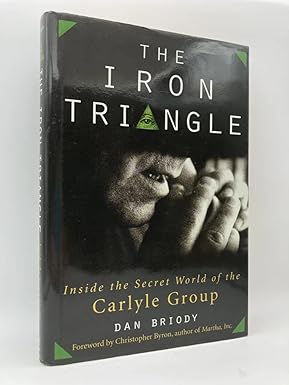
The Iron Triangle: Inside the Secret World of the Carlyle Group
Author: Dan Briody (Author)
ASIN: 0471281085
Publisher: John Wiley & Sons Wiley & Sons
Publication Date: 2003-04-01
Edition: First Edition
Language: English
Print Length: 210 pages
ISBN-10: 9780471281085
ISBN-13: 9780471281085
Book Description
A penetrating look at the company at the nexus of big business, government, and defense
The Carlyle Group is one of the largest private equity firms in the world with over $13 billion in funds. Carlyle’s investments include everything from defense contractors to telecommunications and aerospace companies. But there is more to this company than meets the eye. Carlyle’s executives include heavyweights from the worlds of business and politics, such as former secretary of defense and CIA deputy director Frank Carlucci, former secretary of state James Baker III, former President George Bush, former UK Prime Minister John Major, and former chairman of the SEC Arthur Levitt. Osama Bin Laden’s estranged family was personally invested in the group until recently. In The Iron Triangle, journalist Dan Briody examines a company at the nexus of big business, government, and defense that, according to some sources, epitomizes corporate cronyism, conflicts of interest, and war profiteering. This fascinating examination leads readers into a w orld that few can imagine-full of clandestine meetings, quid pro quo deals, bitter ironies, and pettyjealousies. And the cast of characters includes some of the most powerful men in the world. Strap in, because this ride could get a little bumpy.
Dan Briody (New York, NY) is an award-winning business journalist whose Red Herring article “Carlyle’s Way” broke the story on the inner workings of the Carlyle Group. Briody has appeared on numerous radio and television programs covering the Carlyle Group and has become a primary source for other journalists covering this story. Briody’s articles have appeared in Forbes, Red Herring, and the Industry Standard.